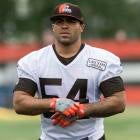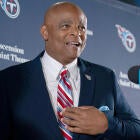Cleveland Browns linebacker Mychal Kendricks may have ruffled some feathers in Philadelphia this week when his latest comments on HBO's "Hard Knocks" highlighted perceived weaknesses in some of his former Eagles teammates.
But Kendricks appears to have much bigger concerns now.
The Super Bowl LII champion has been charged by federal authorities with insider trading, U.S. attorney William McSwain announced in Center City, Philadelphia, on Wednesday. A few hours after learning of the charge, the Browns decided to cut ties with Kendricks, who had just signed with the team in June.
Tied to illegal investments he made in 2014, when he was still playing for the Eagles, the charges are likely to precede a guilty plea by the linebacker, as The Philadelphia Inquirer's Jeremy Roebuck reported.
TV writer and former Goldman Sachs analyst Damilare Sonoiki was "brazenly passing along insider information," including heads-ups on stock mergers and acquisitions, to Kendricks from 2013 to 2015," Roebuck reported via Twitter. In exchange for the inside information, Kendricks allegedly provided $10,000 in cash and Eagles tickets to Sonoiki.
Although it appears Kendricks let the Browns know some of the details of the situation before he signed in June, it seems like he may have misled the team. According to general manager John Dorsey, Kendricks painted himself as a victim in the case.
"Prior to signing Mychal, we were informed that there was a financial situation that he had been involved with in 2014," Dorsey said in a statement. "We were told Mychal had fully cooperated with investigators as a victim."
However, Kendricks definitely wasn't a victim in the case and he even admitted to wrongdoing on Wednesday in a statement that was released through his attorney:
I apologize. Four years ago, I participated in insider trading, and I deeply regret it. I invested money with a former friend of mine who I thought I could trust and who I greatly admired. His background as a Harvard graduate and an employee of Goldman Sachs gave me a false sense of confidence. To that point, I had worked my tail off since I was 5 years old to become the football player that I am today. I was drawn in by the allure of being more than just a football player. While I didn't fully understand all of the details of the illegal trades, I knew it was wrong, and I wholeheartedly regret my actions.
Since the beginning of the investigation, I have fully cooperated with all of the authorities and will continue to do so. I accept full responsibility for my actions. Although I did not take any of the profits for myself, I am committed to repaying all of the funds gained illegally and accept the consequences of my actions.
I sincerely apologize to my coaches, the owners, and my teammates on the Eagles and the Browns, the NFL, and the magnificent fans to whom I owe my career. I also apologize to my family, who I have failed in this. You all deserve better, and I will work my hardest to re-earn your trust and respect, serve as an advocate to educate others, and show you that I will never be involved in anything like this again. Thank you for your time and hopefully your forgiveness.
Kendricks' charges fall in "uncharted waters" for the NFL, according to Fox Sports' Jay Glazer, who suggested Wednesday that the veteran's violations "could fall under" the league's personal conduct policy. Basically, if Kendricks ends up signing with another team, there's a chance he could be facing a punishment from the league before he's allowed to suit up again.
From a legal standpoint, Kendricks' career could take the biggest hit by way of incarceration.
David Weinstein, a South Florida criminal defense attorney and former state prosecutor, told CBSSports.com on Wednesday that Kendricks could serve something like 8-12 months in prison. Using a calculation involving federal sentencing guidelines, he estimates that Kendricks will receive an advisory sentence of something like two to five years in jail time but that "the judge should go down from that sentence" for a number of reasons -- either thanks to a split sentence, a mutual sentence agreement, house arrest, community service requirements or a combination of them.
"The advisory sentence is going to be higher," Weinstein said. "Three to four to five years. But if he enters into a plea, they'll figure out what the guidelines are going to be. Assuming he's going to pay back whatever money he made from this, he'll serve much less time ... and (still) I think of people like Martha Stewart who went in and did some time, and it's unfair just because this guy's an athlete that he's going to get off with no time at all. I've got to think that it's going to be in the neighborhood of just around a year or so, with maybe half of it on home confinement."
![[object Object] Logo](https://sportshub.cbsistatic.com/i/2020/04/22/e9ceb731-8b3f-4c60-98fe-090ab66a2997/screen-shot-2020-04-22-at-11-04-56-am.png)


















